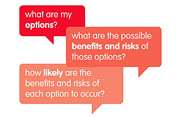Ask 3 questions, patients urged

Asking three simple questions could help patients have more say and better understand their treatment options, according to University research.
Researchers from the University’s School of Medicine’s Department of Primary Care and Public Health have been working alongside doctors and nurses from Cardiff and the Vale University Health Board to develop tools to get the public more involved in deciding how they are treated.
By encouraging patients to ask three simple questions: What are my options? What are the possible benefits and risks of those options? How likely are the benefits and risks of each option to occur? the researchers hope to improve patient knowledge and encourage engagement with health staff to develop more tailored treatment.
The work is based on research that shows shared decision making can lead to better outcomes for patients. The Making Good Decisions in Collaboration (MAGIC) programme, funded by the Health Foundation, is a joint venture between Cardiff School of Medicine, Newcastle University, Cardiff and Vale University Health Board and Newcastle-upon-Tyne Hospitals NHS Foundation Trust.
The 18-month programme, joint led by Professor Glyn Elwyn, School of Medicine, aims to explore how clinicians can engage patients in shared decision making and how it can be embedded into mainstream health services.
Keith Cass, who was diagnosed with prostate cancer, has been using the 3 Questions during his treatment and played a part in developing the tools. Mr. Cass said: "I’m really pleased with the way it is going ahead and the number of patients that have been involved. We do feel we are part of the decision making team.
"It is us that are ill and we want to have some control at least over the decisions about our health and treatments. I think these tools will definitely be helpful.
"Patients are asking questions that they wouldn’t have asked before. I’ve made decisions about my treatment that have been based on my quality of life. I think the MAGIC Project helped me make those decisions. It’s helped me become I’m more aware of my illness. There’s massive benefit for patients."
Shared decision making is known to work well in situations where there is more than one reasonable course of action.
Patients are often faced with difficult decisions to make, whether it’s about choosing to have treatment or choosing between different treatment options. The best decision for the patient will depend on what matters most to them. In order to think about what’s important, they need to know about the full range of options available and the likelihood of different outcomes happening - the three questions can help support this.
Professor Elwyn, School of Medicine, said: "Many good decision support tools exist already, but aren’t widely used. We want to raise awareness of shared decision making and find ways to introduce sustainable change that can be easily replicated in other areas."
More information: More information on the Ask 3 Questions campaign is available at: www.cardiffandvaleuhb.wales.nhs.uk/ask3













